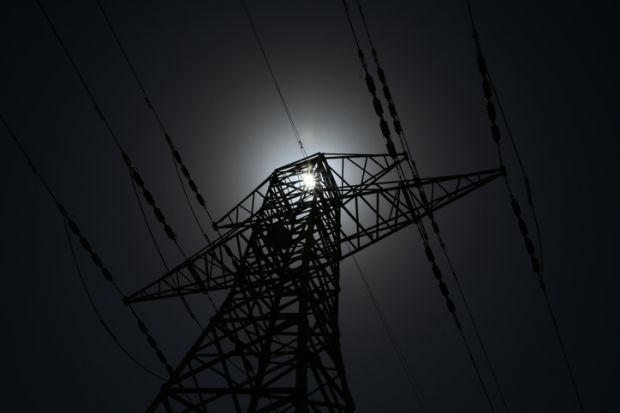Regular power outages in South Africa have caused repeated disruptions for researchers at the country’s top universities and risk demoralising students, it has been warned.
President Cyril Ramaphosa has declared a national state of disaster as a result of an increase in “load-shedding” blackouts, which have become a regular part of life in the country, and recently appointed the country’s first-ever minister of electricity to seek to address the issues.
The University of the Witwatersrand in Johannesburg has been forced to deploy diesel backup power generators across all its campuses to mitigate disruption, deputy vice-chancellor Ian Jandrell said.
“These efforts come at an enormous operational cost in the form of consumables, maintenance and repairs, and support staff,” he added.
But such efforts have not stopped the power outages from having a “major impact” on research, according to Nigel Bennett, professor of zoology at the University of Pretoria.
The generators are not designed to be used as much as they are now, resulting in some of them breaking, he explained.
“More so is the damage to sensitive research equipment that arises from the power surges resulting from the off and on of municipal power.
“Load-shedding has become progressively worse in the last few months and is waging havoc on research.”
Eskom, the national electricity company, began cutting demand as early as 2007 as an emergency measure but outages have increased substantially of late.
Brenda Wingfield, professor of genetics and deputy dean at the University of Pretoria, has personally invested in solar power for her own home and installed multiple internet service providers to ensure she has a “backup and a backup on our backup”.
She said if students need equipment to run overnight, they have to remain on campus to ensure it does not turn off, which was “very frustrating”. The situation was contributing to delays for full-time research students, who have limited time and funding to complete their studies, she added.
While Professor Wingfield, who is a former chairperson of the National Science and Technology Forum, said she was in a lucky position; she feared for other institutions that might be facing “total disaster”.
“I wonder if anyone really understands how incredibly essential our universities are for the economy of the country.
“We have the best tertiary education system on the continent; if our universities fail, we will have to import even more skilled people than we are already – at huge cost.”
The slowing down of research has had a knock-on effect on the motivation and enthusiasm of students, said Don Cowan, director of the Genomics Research Institute at the University of Pretoria.
“You have to be highly motivated and driven to get a PhD because it is tough work, but there’s been a negative motivational effect on students and a lot of colleagues have seen something similar.
“Without question my students have been slowed down by the Eskom outages, despite the best efforts of the university.”
He said it was frustrating for both staff and students, who were having to fight additional battles, and he expected to see a rise in postgraduate drop-out rates when the figures were next published.
“It’s gone from being an occasional problem to something continuous, which suggests that since these failures are unpredictable and unpreventable, in a way we’re going to have to live with this; it isn’t going to go away very quickly.”
Zandile Mbabela-Ngwendu, a spokesperson for Nelson Mandela University, said the load-shedding projections for 2023 implied the situation was likely to get worse.
She said lectures were regularly being interrupted for up to 10 minutes at a time, while outages increased the likelihood of damage to teaching and research equipment.
Register to continue
Why register?
- Registration is free and only takes a moment
- Once registered, you can read 3 articles a month
- Sign up for our newsletter
Subscribe
Or subscribe for unlimited access to:
- Unlimited access to news, views, insights & reviews
- Digital editions
- Digital access to THE’s university and college rankings analysis
Already registered or a current subscriber?








